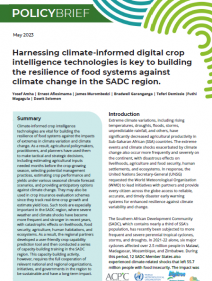Climate-informed crop intelligence technologies are vital for building the resilience of food systems against the impacts of extremes in climate variation and climate change. As a result, agricultural policymakers, practitioners, and planners have used them to make tactical and strategic decisions, including estimating agricultural inputs needed months before the crop-growing season, selecting potential management practices, estimating crop performance and yields under various seasonal climate forecast scenarios, and providing anticipatory options against climate change. This capacity-building activity, however, requires the full cooperation of relevant national and regional organizations, initiatives, and governments in the region to be sustainable and have a long-term impact.
Share this:
Release Date:
12 July, 2023
© United Nations Economic Commission for Africa

